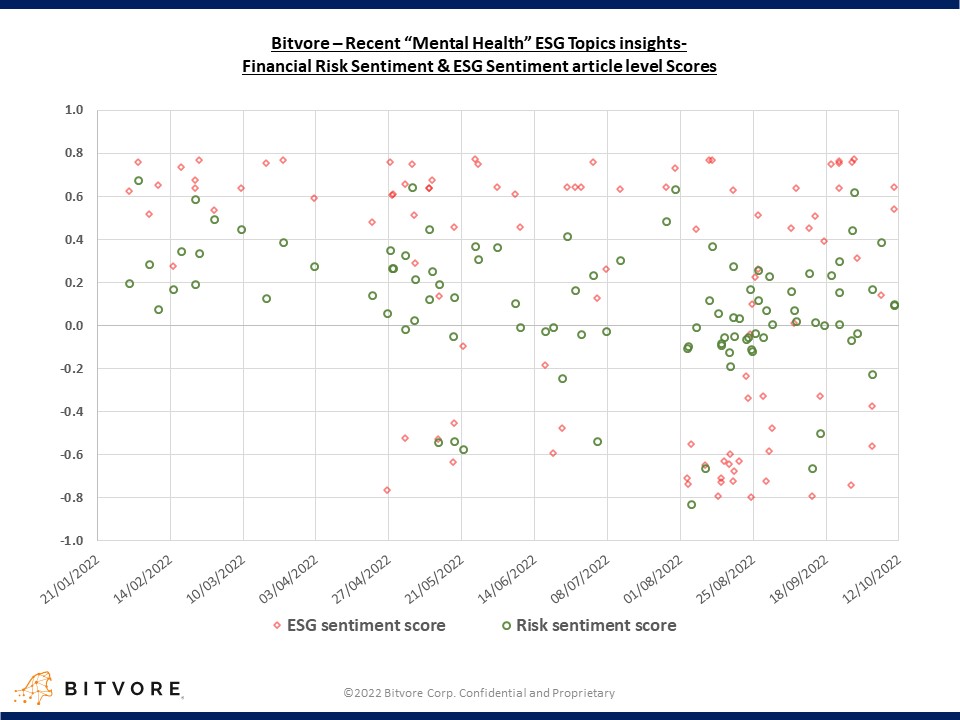
An estimated 15% of the world’s working population experiences a mental disorder at any given time according to the Global Health Data Exchange. The stark human and economic costs associated with poor mental health are starting to become a focus for business leaders and investors.
There is no doubt employers are losing billions of dollars because employees sadly are less productive, off sick or leaving work all together. A universal challenge for companies is how to support and nurture a workforce to protect its mental health. As we hopefully settle into the aftermath of the Covid-19 crisis which swept across the globe, there must surely be a greater level of urgency by businesses to act to address the growing mental health issues their colleagues and businesses are facing.
A combination of remote working, social isolation, quarantine, bereavement, and the pending recessions are having have unprecedented mental health consequence. This is a unique time to address workplace mental health.
Financial Cost of Mental Health Challenges
With the support of Chronos Sustainability, and an Expert Advisory Panel including Paul Farmer (of the charity Mind), Lord Dennis Stevenson, the Principles for Responsible Investment and others, London-based CCLA Investment Management (CCLA) has spent the past two years building and refining a set of assessment criteria. In Q1 2022, they used these criteria to evaluate and score the 100 largest UK-listed companies with more than 10,000 employees on their public disclosures. On 26 May 2022, the CCLA Corporate Mental Health Benchmark UK 100 was launched. Last week, the CCLA Corporate Mental Health Benchmark Global 100 was launched.
The CCLA Corporate Mental Health Benchmarks are the culmination of sustained collaboration with workplace mental health experts, data providers, charities, and UK-listed and global companies. CCLA advocate that successful companies safeguard staff mental health because in doing so they also safeguard their economic success.
Few would disagree that companies have a moral duty to provide their workers with a psychologically safe place of work. Despite increasingly frequent discussion in everyday life, one of the biggest obstacles to good workforce mental health is a reluctance to talk about it. Stigma around mental ill-health is real, and it persists. There is a wealth of evidence to suggest that one of the major triggers of mental ill health is stress, frequently caused by an individual’s working conditions.
The financial ramifications for employers are profound. An estimated 17 billion productive working days are lost every year globally to depression and anxiety alone, at a cost of nearly US $ 1 trillion. Mental health is unquestionably a business risk that should be managed, employers have a moral and ethical duty not to cause psychological injury, and that they must, therefore, endeavour to address these issues.
Are Companies Acting?
Findings from CCLA’s recent Global 100 report illustrate strong recognition of the issues but a noticeable lack of action. 90% of companies recognise workplace mental health as an important business concern. Yet less than half have formalised their commitments to mental health in a policy statement. Almost one in three global companies has committed to removing the stigma associated with mental health. But few global leaders are championing the issue. Global companies are investing in mental health programmes and initiatives, yet reporting on the uptake of these is rare. There would appear to be no shortage of metal health initiatives and interventions, yet many global companies lack effective governance and management processes to sustain action on workplace mental health.
CCLA, and others, advocate that companies should publish a mental health policy statement and make clear the governance and management processes in place to ensure it is implemented. Objectives and targets should be set to improve workplace mental health with regular reporting on progress.
Trusted by more than 70 of the world’s top financial institutions, Bitvore provides the precision intelligence capabilities top firms need to counter risks and drive efficiencies with power of data-driven decision making. Investors are increasingly building out their own ESG and Sustainability research, analysis and risk control functions to dive deeper into the types of insights our processes uncover. A recent "mental health" query within our ESG social topics showed a marked increase in relevant insights over the last six months. Over the last three months there has been an increase in insights highlighting potential ESG and financial risks.

One example is mental healthcare providers with Kaiser Permanente are demanding changes to their workflow to facilitate better patient care. Kaiser mental health therapists in northern California and the Central Valley are now entering week 9 of an open-ended strike to win adequate access to mental healthcare for the 4.6 million Kaiser Permanente members they serve, having recently overwhelmingly voted to turn down the giant HMO’s latest contract offer.
The Kaiser clinicians and the National Union of Healthcare Workers have been waging a 12-year-long struggle to get the giant healthcare corporation to provide the same level of care for mental health as it does for medical services. Their efforts have brought results. Kaiser has been fined by state regulators for denying members timely access to care, and the state legislature passed Senate Bill 221, which requires health insurers to provide mental health therapy appointments within 10 business days unless the treating therapist determines a longer wait will not harm the patient’s health. But while SB 221 took effect July 1, Kaiser allegedly continues to make patients wait months for therapy sessions.
Uncover rich streams of risk and ESG insights from unstructured data that act as the perfect complement to the internal data and insights your firm is already generating. Our artificial intelligence and machine learning powered system provides the ability to see further, respond faster, and capitalize more effectively.
Get in touch today to learn how the Bitvore solutions can help your organization at www.bitvore.com.

